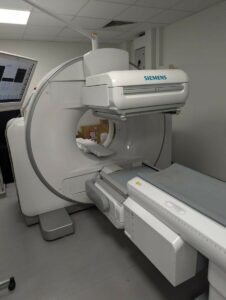Nuclear Medicine
Overview
Nuclear Medicine refers to the medical use of radioactive substances for the diagnosis or treatment of medical conditions. Nuclear Medicine tests often provide information on how and organ or system works rather than just how it looks, as in many other imaging modalities.
It is a rapidly evolving medical imaging specialisation. At the Luton and Dunstable Hospital, there are two scanners, one SPECT / CT system and a dedicated Cardiac Gamma Camera.
Studies undertaken assist in diagnosis of many conditions relevant to oncology, cardiology, urology, endocrinology, gastroenterology and neurology, all areas of key medical priority.
We perform a wide range of routine in-patient and out-patient radionuclide diagnostic procedures including lung perfusion & ventilation, bone, renal, biliary system, Meckel’s, infection/ inflammation, thyroid/ parathyroid, lymph node imaging, sentinel node (breast) localisation studies, gastric motility and bile salt absorption studies, lacrimal drainage.
Our cardiology service includes Myocardial perfusion Imaging and investigation of Cardiac Amyloidosis.

